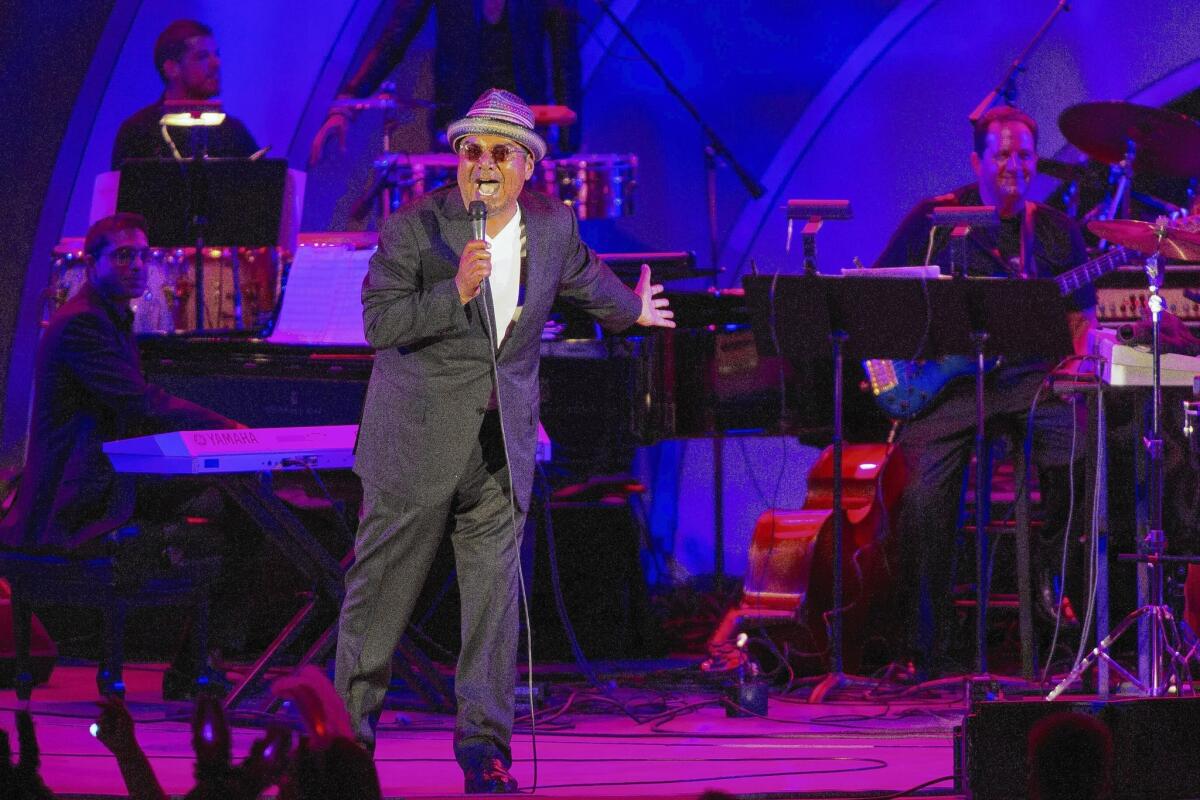Review: A lot of chitchat — and some music — at Playboy Jazz Festival

- Share via
The Playboy Jazz Festival requires stamina.
The crowd at the Hollywood Bowl never had more than a 30-second break from the moment the first band started at 3 p.m. Saturday until the last note echoed up the hill just before 11. The rotating stage traded one rumbling bass player for another without a hitch, a tremendous innovation that allowed twice as many bands to play in a night but prompted the crowd to stretch and socialize during performances — waves of distraction that some musicians handled better than others.
Within the first hour Saturday, host George Lopez was already hoarse yelling out to the sun-drenched revelers. Tia Fuller appeared on soprano saxophone to relieve the MC with her fierce rhythm section churning behind her. She spent a large part of her set aggressively locking horns with drummer Terreon Gully, who was awash in thunderous retorts. Switching to tenor saxophone, Fuller stepped beyond the shade of the half-shell to sparkle in the sun, offering a soulful sound with a confident delivery.
Seattle-based wunderkind Allen Stone provided a party-friendly set that was better served by his foot-stomping rock than the chicken-wing soul-strut that dominated his appearance. His dance movements were perfectly befitting his boxy white shoes as his band dispensed dorm-room seductions with a little echo and a few radio-friendly guitar hooks.
Pianist Kenny Barron fought off the chatter of the crowd with a strong set of straight-ahead jazz. His trio was joined by tenor saxophonist Ravi Coltrane, who played on a couple of tunes by his father’s former boss, Thelonious Monk. A brisk “Well, You Needn’t” had enough muscular drumming from Johnathan Blake to overcome the din of audience mingling that greeted bassist Kiyoshi Kitagawa’s earlier solo.
During the dinner hour, vocalist Dianne Reeves floated in with a crowd-pleasing performance that included covers of Fleetwood Mac’s “Dreams” and Marvin Gaye’s “I Want You.” The charming frontwoman held center stage as her whip-tight band churned around her.
Hyperactive British jazz piano phenom Jamie Cullum handled the sunset from behind a snare drum. By the second tune, he had shed two articles of clothing and had stood on the piano. He was working overtime trying to engage the audience. Songs about prostitution are rarely appropriate to sing into a stranger’s face, but that didn’t stop Cullum from climbing into the crowd during a sinister “Love for Sale.”
Under the almost full moon, Jello shots flew overhead like bats and tricolored plastic bunny ears blinked blearily in the darkness. About 17,000 people were happily joking, drinking and eating, and a flustered Arturo Sandoval attempted to battle that joviality with stage patter, his frustration evident. Long spells between songs made the crowd only more restless.
But when his band was on, it was unstoppable. High-flying mambos and glass-shattering blasts from Sandoval’s trumpet helped get the crowd on its feet as actor Andy Garcia assumed the role of a bongo brick in the orchestra’s wall of percussion. Patti Austin came out to sing a couple of standards with a no-nonsense, finger-wagging approach, and the audience adored her.
Saturday night closed with a loving tribute to the late keyboardist George Duke, who is beloved by the jazz community. Although his songbook seemed a tad obscure for the Bowl audience, the band delivered the jams regardless. A slender Ndugu Chancler strutted around the stage for a theatrical “Dukey Stick,” and electric bassist Stanley Clarke shredded on “Wild Dog.”
Vocalist Al Jarreau followed, at his most Muppet-esque, filling silences with vocables and closing his introduction of Clarke with the statement “I gotta pee anyway.” During a reflective ballad, a bouquet of roses, a white hat and a keytar stood center stage in honor of the funky fusion trailblazer. Unfortunately, it only helped to point out that nobody played a keytar during the entire tribute.
Sunday returned with more relentless sunshine and breezes. Hard swinging veterans such as Dave Holland and Dr. Lonnie Smith dominated, and octogenarian hometown hero Big Jay McNeely joined the James Cotton Blues Band early in the afternoon for a few slow burners.
In between those experienced leaders, neo-soul stirrers such as José James and Jon Batiste brought a social message and youthful swagger.
After 35 years of Playboy productions, this was the Los Angeles Philharmonic’s first attempt at producing the biggest jazz festival in the city, and its emphasis on “jazz” over “Playboy” was a welcome touch. Sure, the bunnies still worked on their tans in heart-shaped sunglasses, but the activities onstage offered an even brighter level of entertainment.
More to Read
The biggest entertainment stories
Get our big stories about Hollywood, film, television, music, arts, culture and more right in your inbox as soon as they publish.
You may occasionally receive promotional content from the Los Angeles Times.










